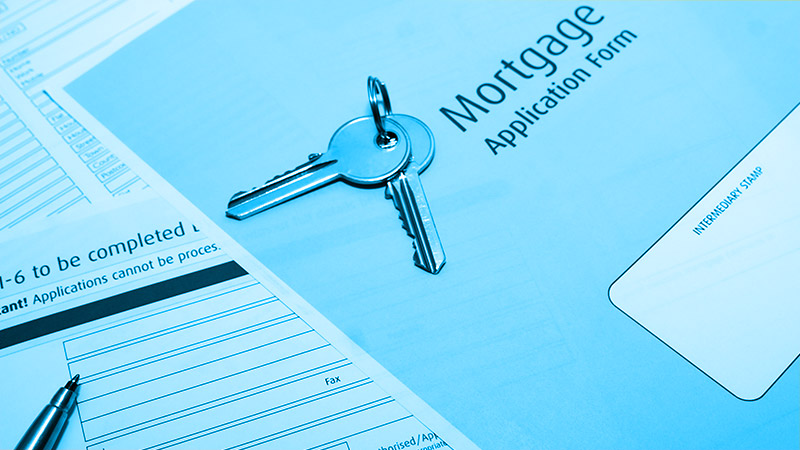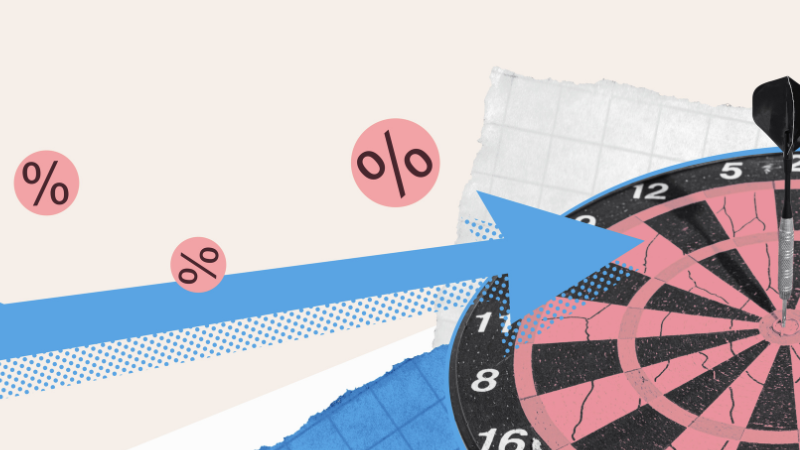Mortgage Application Declined? Here’s What To Do


Has your mortgage application declined despite your careful preparation? It's a frustrating experience that happens to many homebuyers, but the good news is that it doesn't mean the end of your property dreams.
Different lenders use varying criteria when assessing applications, so what stops you from getting a mortgage with one provider might not be an issue with another. There are several common reasons your application might be rejected. If you’ve missed payments recently or had a default or CCJ in the past six years, lenders may be concerned about your reliability. Additionally, making too many credit applications within a short timeframe can result in multiple hard searches on your report, potentially leading to a mortgage being declined after an agreement in principle.
Although being refused for credit won’t directly damage your credit score, understanding why your mortgage was declined is crucial for your next steps. Throughout this guide, we’ll explore the various reasons lenders reject applications, what to do afterwards, and how you can improve your chances of approval in the future—even if you have less-than-perfect credit history. With the right approach and preparation, you can certainly strengthen your position for your next application.
Why was your mortgage application declined?
When a mortgage lender rejects your application, understanding exactly why is crucial for improving your chances next time. Lenders assess multiple factors when reviewing applications, and knowing where you fell short can help you address specific issues.
Missed or late payments
Lenders view missed or late payments as red flags that could indicate financial instability. Late payments stay on your credit report for six years and significantly reduce the number of lenders willing to consider your application. Missed mortgage payments are treated more severely than other types of debt, with most lenders requiring a clean payment history for at least 1-2 years before considering your application.
Moreover, even less serious debts like credit cards, store cards, or utility bills can cause problems if payments are missed. While some lenders take a purely numbers-based approach, others may consider the circumstances behind late payments, especially if they were one-off events or occurred during periods of temporary hardship, such as illness or redundancy.
Too many recent credit applications
Submitting multiple credit applications within a short timeframe can seriously damage your mortgage prospects. Each application typically triggers a hard credit check that remains visible on your credit report. Lenders often interpret this pattern as a sign that you might be struggling financially or overextending yourself.
Notably, making several mortgage applications simultaneously is particularly problematic. While multiple applications don’t directly reduce your credit score points, they do appear when lenders search your credit history, and most interpret multiple rejected applications as a sign of risk.
Not registered to vote
Being absent from the electoral roll might seem minor, yet it can significantly impact your mortgage application. Lenders use electoral registration to verify your identity and current address, making it a fundamental step in fraud prevention.
When you register to vote, your electoral details are recorded on your credit report, helping lenders confirm your personal information and improving your credit score. Without this verification, lenders may request additional identity documents, potentially delaying your application process and reducing your chances of approval.
Self-employed with inconsistent income
Self-employed applicants face unique challenges when applying for mortgages. Research shows nearly half of self-employed people who have applied for mortgages have had their applications rejected. For approximately 30% of those rejected, the reason was their profession being considered too unsteady or irregular.
While employed applicants typically only need to provide three months of payslips, self-employed workers often must submit up to three years of tax returns and business accounts. Lenders are particularly concerned with fluctuating or declining profits, as well as how income is distributed. Additionally, self-employed applicants typically face longer wait times and more rigorous checks during the application process.
Errors or mismatches in your application
Simple mistakes on your mortgage application can lead to immediate rejection. Common errors include:
- Incorrect personal information or address details
- Missing or incomplete documentation
- Information that doesn’t match your credit file
- Errors on your credit report itself
Even small discrepancies between your application and credit report can raise red flags for lenders. Rushing through the application process increases the likelihood of making these critical mistakes, potentially resulting in unnecessary rejections that could have been avoided with careful preparation.
Mortgage declined after agreement in principle
Receiving an Agreement in Principle (AIP) feels like a significant milestone in your home-buying journey, yet many borrowers find their mortgage is declined after this stage. Understanding what happens between an AIP and a formal mortgage offer can help you prepare for potential obstacles.
What does an AIP mean?
An Agreement in Principle is essentially a preliminary assessment from a lender indicating how much they might be willing to lend you based on basic information about your finances. It’s sometimes called a ‘Mortgage Promise’ or ‘Decision in Principle’. In essence, an AIP shows estate agents and sellers that you’re a serious buyer who may be in a position to proceed with a purchase.
However, it’s crucial to understand that an AIP is not a guarantee of mortgage approval. It merely indicates that, based on initial checks, you appear to meet the lender’s basic criteria. Most AIPs involve only a ‘soft’ credit check that doesn’t affect your credit score. AIPs typically remain valid for 30-90 days, after which you may need to reapply.
Why lenders change their decision
Lenders conduct much more thorough assessments during a full mortgage application than they do for an AIP. Consequently, issues that weren’t initially flagged may surface later. Furthermore, your circumstances might change between receiving an AIP and submitting a full application.
A formal mortgage application involves detailed information, supporting documentation, proof of income, and ID verification. This comprehensive review allows lenders to uncover information they weren’t previously aware of. Additionally, lending criteria can change over time, meaning that what was acceptable when you received your AIP might not meet current standards.
Common reasons for post-AIP rejection
Several factors can lead to a mortgage being declined after an AIP:
- Failed final credit check – Underwriters often perform more thorough credit checks that may reveal issues missed during the initial assessment
- Changed circumstances – Drops in income, increased outgoings, or new credit issues appearing on your file since the AIP
- Application errors – Simple mistakes or discrepancies between your AIP and full application information
- Suspected fraud – Inconsistencies that raise concerns about potential fraud
- Property valuation issues – If the property is valued lower than expected or has construction issues
- Paperwork problems – Administrative errors either on your part or by the lender’s team
- Difficulty proving income – Particularly problematic for self-employed applicants or those with irregular income sources
- Unsuitable deposit source – Lenders may reject applications if they discover your deposit comes from unacceptable sources
Remember that lenders are legally entitled to decline a mortgage even after granting an AIP. Therefore, it’s worth treating the AIP as a useful indicator rather than a guaranteed approval. Should your application be rejected at this stage, ask the lender for specific feedback – this information will be invaluable for strengthening future applications and identifying exactly what stops you from getting a mortgage.
Related reading:
Does being declined affect your credit score?
Many homebuyers worry that a rejected mortgage application will damage their credit profile permanently. The good news is that being refused a mortgage won’t directly harm your credit score—your report shows only that you applied, not whether you were accepted or declined.
Impact of hard credit checks
Whenever you apply for a mortgage, the lender conducts what’s known as a ‘hard credit check’ or ‘hard pull’ on your credit report. This thorough examination helps them assess your creditworthiness and financial stability.
A single hard inquiry typically has a minimal effect, usually reducing your FICO Score by fewer than five points or five to ten points for VantageScore credit scores. This impact generally diminishes over time, with most score reductions recovering after just a couple of months.
Nevertheless, these inquiries remain visible on your credit report for up to two years, though they typically only affect your FICO Score for 12 months. Most lenders can see all credit applications you’ve made during that period, giving them insight into your recent borrowing behaviour.
How multiple applications can lower your score
Submitting numerous mortgage applications within a brief timeframe can magnify the negative impact on your credit profile. Multiple hard searches signal to lenders that you might be experiencing financial difficulties or struggling to secure credit.
Fortunately, credit scoring models understand that consumers shop around for the best mortgage rates. FICO treats multiple mortgage inquiries within a 45-day window as a single inquiry. VantageScore uses a shorter 14-day period for grouping similar applications. This ‘deduplication’ process helps protect your score while you compare offers.
It’s worth noting that FICO only groups similar types of loans together—meaning multiple applications for different credit products (like a mortgage and a credit card) will count as separate inquiries. Additionally, FICO ignores all mortgage, auto, and student loan inquiries made in the previous 30 days when calculating your score.
What your credit report shows
Your credit report indicates that you’ve applied for a mortgage, but it doesn’t reveal whether your application was successful. This means potential lenders won’t know if you’ve been rejected—they’ll only see that you made an application.
A prudent approach is to space out credit applications where possible. Credit experts suggest limiting yourself to no more than two or three applications every few months. This strategy helps maintain your score while still allowing you to seek necessary credit.
Remember that although each lender might use different credit reference agencies to assess your application, most lenders have access to similar information. Excessive applications across multiple lenders won’t hide your application history—instead, they could potentially make your situation worse by creating more hard searches on your report.

What to do after your mortgage is declined
Facing a mortgage rejection can be disheartening, yet there are clear steps you can take to improve your chances next time. Understanding what action to take after your mortgage application is declined will help you address the specific issues and strengthen your position for future applications.
Ask the lender for feedback
Firstly, contact the lender directly to request specific reasons for the rejection. Although they might not always provide detailed explanations, it’s certainly worth asking. This feedback is invaluable as it highlights exactly which areas you need to focus on improving. Some lenders may simply state that you “didn’t meet their lending criteria”, whilst others might provide more specific information about credit issues or affordability concerns.
Check your credit report for errors
Subsequently, examine your credit history thoroughly. Order reports from all three major credit bureaus—Experian, TransUnion, and Equifax—as different lenders use different agencies. Look for inaccuracies such as incorrect personal information, accounts you don’t recognise, or mistaken payment histories that could be harming your score. Ensuring your credit report is accurate is fundamental to mortgage success.
Pay off existing debts if possible
Clearing loans and reducing debt positively impacts your credit score. Prior to your next application, focus on paying down outstanding balances, particularly those with high interest rates. Lenders view borrowers with lower debt levels as less risky, which can qualify you for more favourable mortgage rates. Additionally, reducing debt improves your debt-to-income ratio, potentially increasing the amount lenders will offer you.
Lower your credit utilisation
Credit utilisation—the percentage of available credit you’re using—significantly affects your mortgage prospects. Ideally, aim to use no more than 25% of your available credit. For instance, if your credit card limit is £2,000, try to keep your balance below £500. Lowering this ratio demonstrates responsible credit management and typically helps improve your credit score.
Avoid multiple applications in a short time
Henceforth, be strategic with new applications. Spreading out your mortgage applications over time is crucial to avoid lowering your score. Multiple hard searches within a brief period can make lenders think there’s a problem or that you’re being rejected elsewhere. Instead of quickly reapplying after a rejection, take time to address the issues identified and strengthen your financial position. Most experts recommend waiting at least six months before making another application.
Can you still get a mortgage with bad credit?
Bad credit doesn’t automatically close the door on your homeownership dreams. Even after a mortgage rejection, several pathways remain available for securing property finance.
Options for applicants with poor credit
Bad credit mortgages (also known as adverse credit or subprime mortgages) are specifically designed for applicants with credit issues. These function much like regular mortgages but typically come with higher interest rates and stricter borrowing limits. The severity and recency of your credit problems markedly affect your options – most mainstream lenders may reject you if credit issues occurred within the past 12 months, whilst specialist lenders often take a more flexible approach.
Using a mortgage broker
Engaging an experienced mortgage broker proves invaluable for bad credit applicants. Many specialist bad credit lenders only accept applications through trusted intermediaries. A broker’s extensive network includes lenders who specialise in clients with adverse credit histories, providing access to products unavailable to the general public. They can strengthen your application by presenting your case individually to lenders who use manual underwriting processes, examining applications on a case-by-case basis.
Saving for a larger deposit
Accumulating a substantial deposit significantly enhances your chances of mortgage approval with bad credit. Whereas standard mortgages might require 5-10% deposits, bad credit applicants typically need at least 15-25% of the property’s value. This larger commitment reduces the lender’s risk and demonstrates financial discipline. Importantly, providing a bigger deposit might help secure better terms and interest rates.
Considering a guarantor mortgage
Guarantor mortgages offer another avenue, allowing someone (usually a parent or close relative) to back your application. The guarantor agrees to cover mortgage payments if you cannot, offering additional security to lenders. This arrangement works in two main ways: either the guarantor places a significant amount in a savings account held by the lender, or they secure your mortgage against their own property. Be aware that this represents a serious financial commitment for guarantors, potentially putting their own home at risk.
Mortgageable offers a free Equifax Credit Report as part of its service, with no obligation to proceed. Something worth considering.
Conclusion
Facing a mortgage rejection can feel discouraging, yet this setback certainly doesn’t spell the end of your property ownership dreams. Throughout this guide, we’ve explored the common reasons lenders decline applications, from credit history issues to application errors. Undoubtedly, understanding exactly why your application was rejected remains the crucial first step toward future success.
Your next mortgage application stands a much better chance when you address the specific issues that caused the initial rejection. Therefore, requesting detailed feedback from lenders, checking your credit reports for errors, and reducing existing debts should become your immediate priorities. Additionally, lowering your credit utilisation and spacing out future applications will help protect your credit score from further damage.
Even with bad credit, multiple pathways remain available. Specialist lenders, larger deposits, guarantor arrangements, and experienced mortgage brokers can all provide solutions tailored to your circumstances. Rather than rushing into another application, take time to strengthen your financial position first.
Remember that many successful homeowners faced rejections before eventually securing their mortgage. The property market welcomes those who learn from setbacks and prepare thoroughly. Though the process might take longer than expected, your homeownership goals remain achievable with patience, preparation, and the right approach.
Key Takeaways
A mortgage rejection isn’t the end of your home-buying journey—it’s an opportunity to strengthen your application and improve your chances with the right approach.
• Request specific feedback from lenders about why you were declined to identify exact issues that need addressing before reapplying
• Check all three credit reports for errors and focus on paying down debts to improve your credit utilisation below 25%
• Wait at least six months between applications to avoid multiple hard searches damaging your credit score further
• Consider specialist bad credit lenders, larger deposits (15-25%), or guarantor mortgages if you have an adverse credit history
• Use an experienced mortgage broker who can access specialist lenders and present your case to those using manual underwriting
Even with poor credit, homeownership remains achievable through specialist products and strategic preparation. The key is addressing specific rejection reasons systematically rather than rushing into multiple applications that could worsen your position.
















